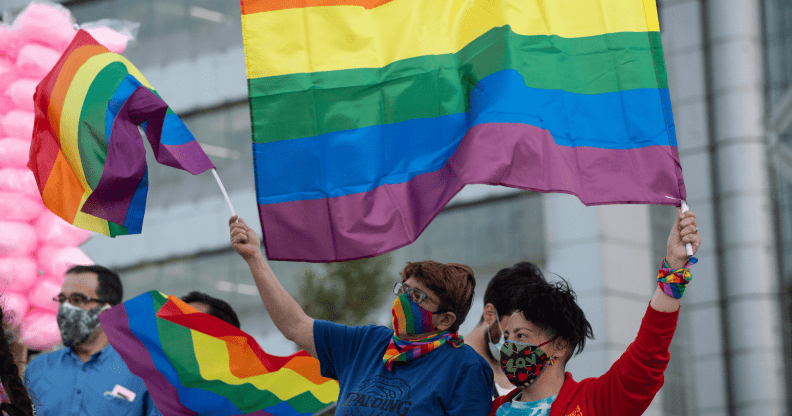Chile overwhelmingly rejects progressive new constitution that would’ve enshrined LGBTQ+ rights

Chilean voters rejected a proposed constitution that would’ve allowed people the right to live as their own identity in “all its dimensions and manifestations”. (Getty)
A majority of voters in Chile rejected a progressive constitution that would have enshrined greater social and LGBTQ+ rights.
With almost all of the ballots counted, 62 per cent of voters rejected the new proposal with only 38 per cent in favour. The vote followed a nearly-two year process aimed to uplift and reflect a broader array of voices in Chilean society through the nation’s document.
The proposed constitution would have significantly expanded social rights, committed to fighting climate change, given the government wider responsibility for social welfare programmes.
It also would have provided full gender parity in government and added designated seats for Indigenous representatives.
The text included protections that would have allowed Chileans the right to live as their authentic identity “in all its dimensions and manifestations, including sexual characteristics, gender identities and expressions”.
Chile’s president Gabriel Boric, who backed the new constitution, said the vote proved the people had spoken “loudly and clearly” about how they wanted to move forward.
“They have given us two messages,” Boric said. “The first one is that they love and value their democracy… The second one is that the people of Chile was not satisfied with the proposed constitution and, therefore, has decided to reject in a clear way at the polls.”
He vowed to put his efforts into “building a new constitutional itinerary alongside congress and civil society”.
Presidente @GabrielBoric se dirige al país tras los resultados del #PlebiscitoConstitucional. https://t.co/BRiqMBJzD7
— Presidencia de Chile (@Presidencia_cl) September 5, 2022
Emilia Schneider, the first out trans person to be elected to the National Congress of Chile, said on Twitter that the recent vote was a “hard result” to accept as the “constitution of the dictatorship does not unite” the people of Chile.
“The cycle of change is not closed,” Schneider wrote. “Citizenship demands social rights and positive democracy. It is urgent to give answers!”
The trans official added the government must “work for a new democratic, equal process” with all people able to participate equally.
El proceso constituyente no acaba aquí. Es hora que quienes desde la vereda del rechazo hagan valer su compromiso. Desde mañana hay que trabajar por un nuevo proceso democrático, paritario, con pueblos indígenas y participativo. Chile habló y necesitamos una nueva Constitución!— Emilia Schneider (@emischneiderv) September 5, 2022
Fundacion Iguales – an organisation working towards equality of rights and non-discrimination of LGBTQ+ people in Chile – said on Twitter that the work towards a more equal society “does not end” with the vote.
“The minimum floor for our next constitution is full equality for women and sexual and gender diversity,” the organisation wrote.
It continued: “Along with this, the right to diverse families, to free development and recognition of identity and personal autonomy, sexual and reproductive rights, right to comprehensive sex education must be recognized and protected. This process continues.”
🔴 Junto a esto, se debe reconocer y proteger el derecho a las familias diversas, al libre desarrollo y reconocimiento a la identidad y autonomía personal, derechos sexuales y reproductivos, derecho a una educación sexual integral. Este proceso sigue.— Fundación Iguales (@IgualesChile) September 5, 2022
“Let’s move forward for a new constitution,” LGBTQ+ group Movilh wrote.
Sigamos adelante por una Nueva Constitución 🏳️🌈🏳️⚧️ pic.twitter.com/d7VE07JmaL— Movilh Chile (@Movilh) September 5, 2022
Chile’s decision to replace its constitution began in 2019 after nationwide peaceful protests, riots and civil unrest that ultimately left 30 people dead.
The South American country is left with the same constitution that went into effect during the brutal dictatorship of general Augusto Pinochet, who ruled the country from 1973 to 1990.
Pinochet’s reign was marked by harsh suppression of dissent against his regime and was held responsible for the torture and deaths of thousands of people.
Chile legalised same-sex marriage in a historic vote in 2021, signalling the beginning of change for the better for the country’s LGBTQ+ community. The first queer couples were able to have their marriages formally recognised in March this year.

